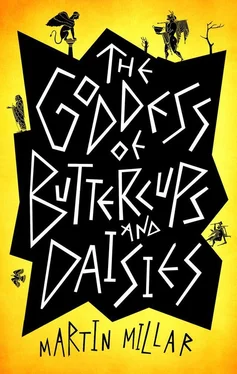‘… the signatories from Sparta being Damagetus, Chionis, Metagenes, Acanthus, Daithus, Ischagoras…’ continued Nicias.
When he’d finished reading out the list of names, he paused, then raised one hand as he spoke to the assembly.
‘The war has now ended!’
The cheering was loud and prolonged as the Athenians contemplated the joys of returning to their normal lives. Those farmers who’d been shut behind the city walls for safety were particularly loud in their applause. Now they could return to their farms. Fields would be tilled, vines and figs planted, and goats sent out to pasture.
Oh sweet peace, wealth-giver to mortals
Aristophanes stared at his feet. He barely heard the cheering. He couldn’t believe that he’d been cheated out of first prize again.
Polykarpos, landlord of the Trident, had rarely seen trade pick up so quickly. There was a mass of business waiting to be done in Athens. As soon as peace was declared, farms, mines and workshops all across the city-state hurried to restart their business. The port was bustling again, and fishing boats were already heading out to sea. Farmers, on their way to market to buy seeds, stopped in at the tavern for a swift drink, meeting friends whose business mending fishing nets was suddenly active again. Potters were busy at their wheels and blacksmiths were hammering out ploughshares, earning money, calling in to the tavern for a reviving drink between shifts. The prostitutes, back in business again, looked much happier, and there were raucous conversations between them and the market women who suddenly had goods to sell.
In the agora they were joking that Hyperbolus and Aristophanes were the only two unhappy men in Athens.
A plague on them anyway, thought Polykarpos . I’ve got no time for politicians. Or artists.
‘That was all a waste of time.’ Idomeneus had been in a poor temper ever since they’d left Athens. It wasn’t helped by carrying their baggage up the steep hills on their journey north.
‘I wouldn’t say that, Idomeneus. I was well paid.’
‘But Athens made peace, didn’t they?’
Laet smiled. ‘I repeat, I was well paid. I provide an excellent service, but I offer no guarantees. Why do you care that they made peace, anyway?’
‘I hate Athens. I’d rather see them swept away.’
‘Really? I didn’t dislike them too much. Some of them anyway. Socrates for one. And young Luxos, if only because I wish someone had written a poem like that about me. I wonder what life has in store for him now he’s become entangled with the immortals? He may find it stranger than he imagined.’
‘To Hades with them all,’ grunted Idomeneus.
‘Idomeneus, you are tiresome when you’re in a bad mood. Don’t worry about Athens. My spirit will linger there. They’ll make plenty of bad decisions in future. Disastrous decisions, very likely.’
Laet looked west. ‘Have you ever been in Syracuse?’
‘Syracuse? Why would we go all the way there?’
‘Just a notion. I’ve always enjoyed travelling.’
Muses, daughters of Zeus, let us hymn the blessed ones with immortal songs.
At Theodota’s house, Luxos was in fine voice, declaiming grandly. He had, it was agreed, a very fine voice for someone of such slender stature. His lyre playing was excellent. The more discerning among his audience could tell that his instrument wasn’t the best, and showed obvious signs of recent repair, but he could play it well, and he got a good tone. If he did make one or two fancy flourishes that purists might not like, well, he was young, and they could make allowances.
Luxos stood at one end of the room, beside a splendid statue of a nymph, sculpted by Phidias. It was one of the few pieces by the famous sculptor to be found in private hands. Theodota had never actually confirmed that Phidias had given it to her just before he passed away, nine years ago, for services rendered when she was fifteen, but it was commonly supposed to be the case.
Theodota sat on a gilded chair, listening appreciatively to Luxos. She’d heard all of Greece’s most famous poets. Many of them had obliged her with private readings. She’d declared Luxos to be a very talented young man, and his reputation, already high after his performance at the theatre, had risen even further. Beside Theodota were several other elegant courtesans, and behind them their servants. Metris was perched on a table, swinging her legs, and the nymph’s presence brought an added cheer to the room.
As Luxos finished his poem, there were smiles and applause. Various women, including Mnesarete, headed straight for him, but they were beaten there by Metris, who did not intend sharing him for the moment.
Aristophanes had complained to Theodota about Mnesarete’s treachery, but the hetaera had laughed it off. ‘Treachery and bribery are mainstays of Athenian politics,’ she’d told him. ‘The assembly sets a very bad example. You can’t blame my maid if she decided to join in.’
In the middle of the night, Luxos and Bremusa, appearing from different directions, were greeted by Metris at the edge of the agora.
‘Hello! I’ve asked you both here for a reason. Not that I need a reason, of course. It’s always lovely to see you.’
Bremusa was more sympathetic towards Metris now their mission was concluded, but regarded her suspiciously out of habit. Aristophanes had invited the Amazon to visit him; she wondered if the nymph knew that.
‘Why are we here?’
Metris pointed towards an ancient piece of stone.
‘The Altar of Pity. Laet ruined it. Stonemasons repaired it, and the head of all religion in Athens came to consecrate it. But it isn’t working properly.’ Her face fell. ‘They couldn’t really fix it. Laet was too powerful.’
She laid her hand on the altar and sighed. ‘No one can pray here properly any more. It’s such a shame.’
Bremusa was puzzled. ‘Is it really that important? Athens is full of temples. You can hardly move without finding somewhere to pray.’
‘This is the Altar of Pity,’ said Metris. ‘The place of last resort. When everything else fails, you can come here. I thought it was a nice thing to have.’
‘I suppose so.’
Luxos liked the altar too. He’d known family members use it, back when he had a family.
‘I tried to make it better,’ continued Metris. ‘But I couldn’t. So I asked Goddess Athena if she could help. She couldn’t either. She said the altar was older than her, and she had no power over it.’
‘Then what do you have in mind?’
‘Athena suggested I gather up people with spiritual power and try again.’
Bremusa raised her eyebrows. ‘Is that meant to include me? My spiritual power would be around zero, I imagine.’
‘I’m sure it’s not,’ said Metris. ‘You’ve been an Amazon for hundreds of years and you’ve lived on Mount Olympus. You must have something inside you or that wouldn’t have happened. And Luxos, I’m sure you’re spiritual. You write such lovely poems.’
Luxos shook his head. ‘I’m not that good a poet. And I’m too young. You need to be old and experienced before you can write anything that powerful.’
‘We have to try. Don’t you know anything that would be appropriate?’
Luxos, for once, looked uncertain on the subject of poetry.
‘Isn’t there some hymn to Mother Earth, oldest of beings?’ said Bremusa.
‘Yes, I know that.’
‘I’m sure that will be perfect,’ said Metris. ‘Everyone put your hands on the altar while Luxos recites the poem.’
Читать дальше












